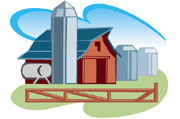Bulletin #2306, Maine Farm Safety Program: Eye Protection for Farmers

Bulletin #2306, Maine Farm Safety Program: Eye Protection for Farmers (PDF)
By Dawna L. Cyr, Farm Safety Project Assistant, and Steven B. Johnson, Ph.D., Extension Crops Specialist
For information about UMaine Extension programs and resources, visit extension.umaine.edu.
Find more of our publications and books at extension.umaine.edu/publications/.
Eye injuries can translate into pain, loss of time, money and even your eyesight. Even a slight loss or impairment of your vision is a tremendous price to pay for a moment of carelessness. It is a dreadful reminder of what taking a risk can mean. Wear proper eye protection where eye hazards are apparent and use common sense. Become acquainted with proper first aid treatment for eye injuries and seek medical attention if there is an eye injury.
Causes of Eye Injuries
Spray cans are an increasing source of chemical eye injury, compounded by the force of contact. Whether containing caustics or irritants, spray cans must be carefully used and kept away from children.
Particles of rocks, soil, crop material or other foreign objects thrown from farm equipment that chops or grinds can cause unexpected eye injury to the operator or bystander. Keep machinery properly shielded. Keep away from the discharge path.
Eye injuries are more likely to occur when servicing farm equipment than when operating it. Simple hand tools can cause severe eye injuries. Wear industrial strength eye protection when using hand tools. Select the right tool for the job.
- Have the proper eye protection at the job site.
- Use eye protection when it is warranted.
Eye Protection
Protective eyewear should be carefully selected, fitted and cleaned. Protective eyewear should be reasonably comfortable and fit snugly without interfering with the movements or vision of the wearer. Protective eyewear should be durable, easily cleaned and capable of being disinfected. It should be kept clean and in good repair. To shield eyes from flying objects, wear industrial-rated glasses or sunglasses and flexible or cushion-fitting ventilated plastic goggles that fit over ordinary eyeglasses. Adding side shields increases protection. Wear splash goggles when handling and applying agricultural chemicals. Farmers can also wear welding goggles to protect their eyes from intense light and sparks. Full face shields are another option for eye protection and can be worn comfortably. Never wear contact lenses when handling ammonia or other farm chemicals. Store eye protection in clean, dust-proof containers.
Basic eye protection for the glasses or sunglasses wearer is a must. The glasses wearer should wear a face shield, goggles or spectacles with protective lenses. The glasses should be of industrial quality with flame-resistant frames. Wearing outdated glasses or sunglasses offers no protection and may even be dangerous as they tend to splinter or shatter on impact.
Basic First Aid
Proper first aid for eye injuries is critical. The method of first aid needed depends upon the type of injury sustained. Let natural tears wash out specks or particles in the eye. Try not to rub the eyes if possible. If this does not work, see a physician. For blows to the eye, apply cold compresses for 15 minutes and again each hour as needed to reduce pain and swelling. If the blow was hard enough to cause discoloration, see a physician. Internal damage could have occurred. For cuts and punctures to the eye, do not do anything to the eye but bandage it lightly and see a physician at once.
Chemical burns on the eyes can be minor to very serious. Fresh water should be available for irrigating eyes anywhere chemicals are used. If the eye comes in contact with any chemical, it should be continuously flooded with water for at least 15 minutes. Do not put anything else in the eye. See a physician and take the label or container of the chemical involved.
This Maine Farm Safety fact sheet is part of an educational fact sheet series produced by University of Maine Cooperative Extension. For more information on farm safety, contact your UMaine Extension County Office.
Information in this publication is provided purely for educational purposes. No responsibility is assumed for any problems associated with the use of products or services mentioned. No endorsement of products or companies is intended, nor is criticism of unnamed products or companies implied.
© 2002, 2020
Call 800.287.0274 (in Maine), or 207.581.3188, for information on publications and program offerings from University of Maine Cooperative Extension, or visit extension.umaine.edu.
In complying with the letter and spirit of applicable laws and pursuing its own goals of diversity, the University of Maine System does not discriminate on the grounds of race, color, religion, sex, sexual orientation, transgender status, gender, gender identity or expression, ethnicity, national origin, citizenship status, familial status, ancestry, age, disability physical or mental, genetic information, or veterans or military status in employment, education, and all other programs and activities. The University provides reasonable accommodations to qualified individuals with disabilities upon request. The following person has been designated to handle inquiries regarding non-discrimination policies: Director of Institutional Equity and Title IX Services, 5713 Chadbourne Hall, Room 412, University of Maine, Orono, ME 04469-5713, 207.581.1226, TTY 711 (Maine Relay System).

